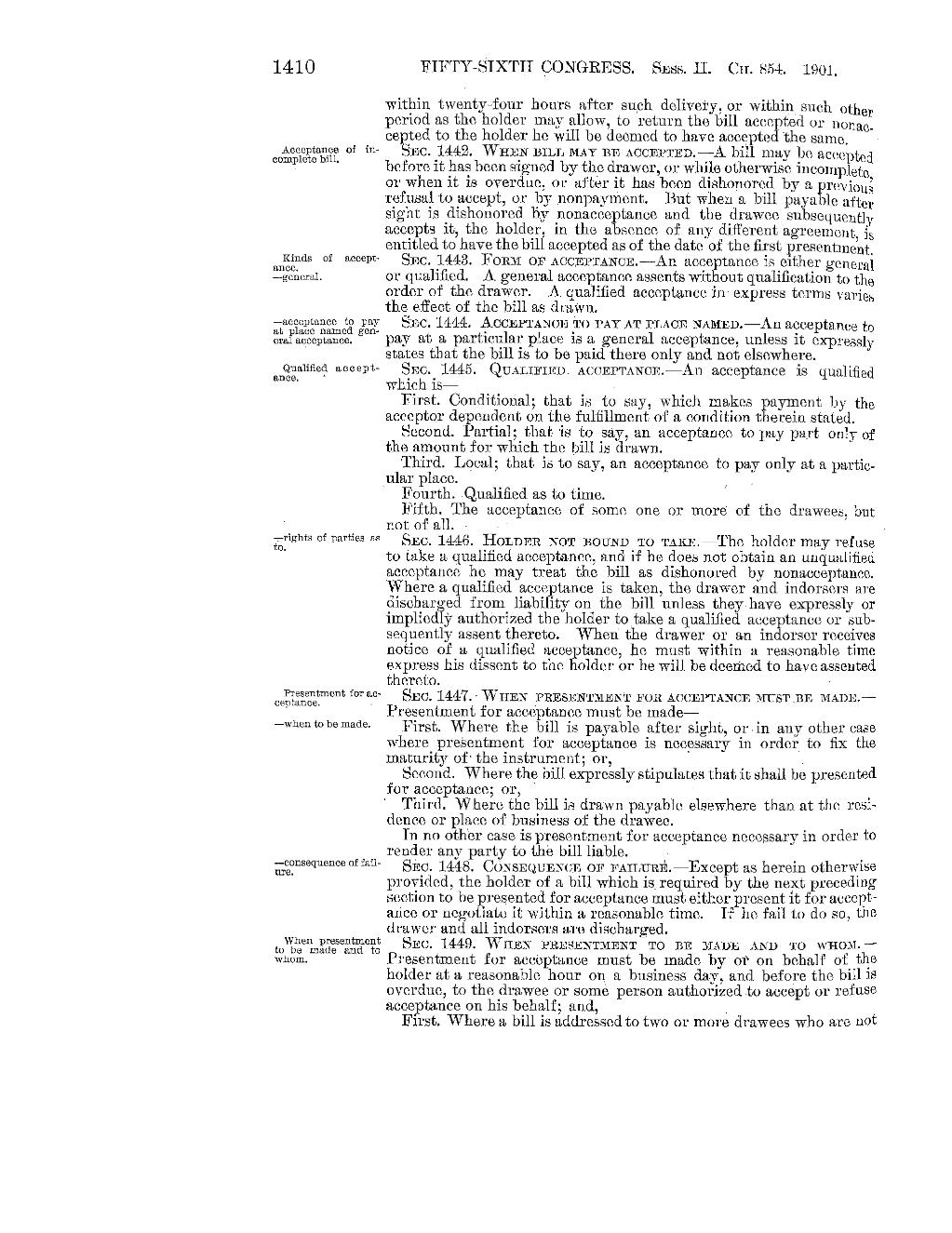1410 E1ETY-sixT11 eoNe1aEss. sms. 11. Ch. s54. 1901. within twenty-four hours after such delivery, or within such other period as the holder may allow, to return the bill accepted or nonaecepted to the holder he will be deemed to have accepted the same. - C Acclirggalgep of in- Sec. 1442. WHEN BILL MAY BE AcoE12TED.—A bill may be accepted °ml)before it has been signed by the drawer, or while otherwise inccnipiem or when it is overdue, or after it has been dishonored by a prcvioué refusal to accept, or by nonpayment. But when a bill. payable aftersight is dishonored by nonacceptance and the drawee subsequently accepts it, the holder, in the absence of any diderent agreement, is entitled to have the bill accepted as of the date of the first presentment. Kinds of e¤¤<¢1>*· Sec. 1443. FORM OF ACCE1?TANCE.—An acceptance is either geneya] HJICG. . . · .
- ge¤era1. or qualified. A general acceptance assents without qualification to the
order of the drawer. A qualified acceptance in express terms varies the effect of the bill as drawn. Qacqgpgaggiugg 1:;;; SEO. 1444. ACCEPTANCE TO PAY AT PLACE NAMED.———A11 acceptance to emitmcpmme, g pay at a particular place is a general acceptance, unless it expresely ` states that the bill is to be paid there only and not elsewhere. améggaliicq ¤»¤<>¤1>t· 1445. Q11A1.1E1ED AOCEPTANCE.—A11 acceptance is qualified w ic lS··— First. Conditional; that is to say, which makes payment by the acceptor dependent on the fulfillment of a condition therein stated. Second. Partial; that is to say, an acceptance to pay part only of the amount for which the bill is drawn. Third. Local; that is to say, an acceptance to pay only at a partic- _ular place. J . Fourth. Qualified as to time. Fifth. The acceptance of sonic one or more of the drawees, but » ‘ not of all. - » · _ {Sights Of Parties as SEO. 1446. TTOLDER NOT BOUND TO rAKE..—The holder may refuse ` to take a qualified acceptance, and if he does not obtain an unqualified acceptance he may treat the bill as dishonored by nonacceptance. Where a qualified acceptance is taken, the drawer and indorsers are discharged from liability on the bill unless theyhave expressly or impliedly authorized the holder toytake a qualified acceptance or subsequently assent thereto. When the drawer or an indorser receives notice of a qualified acceptance, he must within a reasonable time express his dissent to the holder or he will be deemed to have assented thereto. . 1 - cG§{;§§gm°¤t im SF SEc. 1447. · WHEN IPRESENTME-NT Eon ACCEPTANCE MUSTXBE MADE.* ' Presentment for acceptance must be made- —Wh€“*° be md‘*· First. Where the bill is payable after sight, orlin any other case where presentment for acceptance is necessary in order to fix the maturity of the instrument; or, 1 Second. Where the bill expressly stipulates that it shall be presented for acceptance; or,‘ V _ T Third. Where the bill is drawn payable elsewhere than at the residence or place of business of the drawee. ° In no other case is presentment for acceptance necessary in order to render any party to the bill liable. _ §‘;,‘f“S"q“"“°° °“““‘ Sec. 1448. CONSEQUENCE OF EA1LUaE.+Except as herein otherwise provided, the holder of a bill which is required by the next preceding section to be presented for acceptance must either present it for acceptance or negotiate it within a reasonable time. If he fail to do so, the drawer and all indorsersare discharged. m"l{,l;GI;¤§(g‘éS€§;§,1°*g(f Sec. 1449. W11EN 1·EEsENTMENT TO BE MADE AND TO w11oM.~· whom. Presentment for acceptance must be made by or on behalf of @{6 holder at a reasonable hour on a business day, and before the bill is overdue, to the drawee or some person authorized to accept or refuse acceptance on his behalf; and, _ First. Where a bill is addressed to two or more drawees who are not
